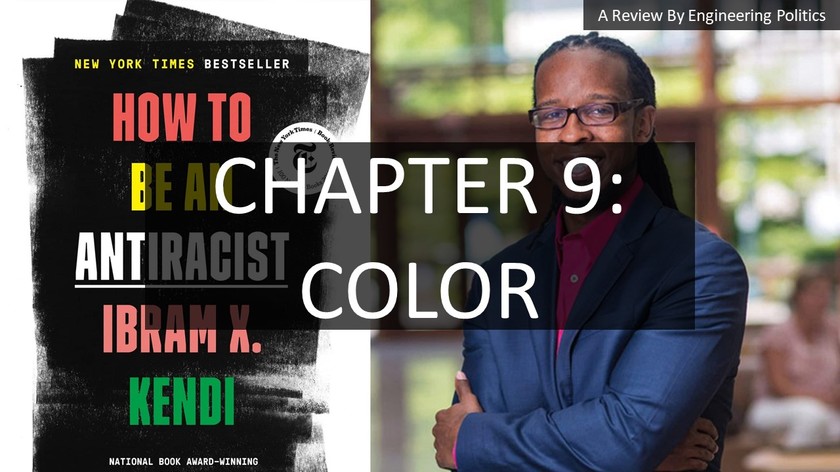
We are officially halfway! Kendi covers the idea of colorism in this chapter, which is a term coined by novelist Alice Walker, an anti-Semite who believes in the Lizard Illuminati, in 1983. This chapter review will be relatively short mostly because it’s devoid of any real intellectual value. Kendi starts out the chapter by defining Colorism and Color Antiracism.
“COLORISM: A powerful collection of racist policies that lead to inequities between Light people and Dark people, supported by racist ideas about Light and Dark people.
COLOR ANTIRACISM: A powerful collection of antiracist policies that lead to equity between Light people and Dark people, supported by antiracist ideas about Light and Dark people.”
So, the first thing you might be asking yourself is, “self, what’s the difference between Kendi’s definition of racism and colorism?” The answer Kendi will give, as I will get to later in this review, is some explanation of inequities within Dark people mirroring inequities within the races. If you think this is some nonsensical drivel, just wait until you read his actual explanation. Be prepared to go cross-eyed. From everyone else who don’t follow critical theory, this just seems like a way he can add more weight to the book. And by weight, I mean physical weight. There was really no value to the chapter other than creating another avenue for an oppression narrative and add a few more pages to the book. Also, quick note, why is he capitalizing the terms Light and Dark? The idea of capitalizing White and Black is also stupid but is at least popular in the immature world we live in right now, but to assume shades of color should formally represent a class of people is a new level of stupid. But in the spirit of giving each chapter some sort of coverage, I will continue on.
“Colorism, like all forms of racism, rationalizes inequities with racist ideas, claiming the inequities between Dark people and Light people are not due to racist policy but are based in what is wrong or right with each group of people. Colorist ideas are also assimilationist ideas, encouraging assimilation into – or transformation into something close to – the White body.”
Kendi gives some personal stories about him in college wearing colored eye contacts that make his eyes lighter in color, but he also wears corn rolls. Because he considers the act of lightening his eye color as an attempt to appear more white but still has a haircut that the maintains his blackness, and refers to this as a dueling consciousness (see chapter 2 review). It’s the internal struggle to maintain his blackness but appearing more white that he sees as himself acting racist. The only problem here is only an actual racist would even care about this dueling consciousness because, as Kendi mentions in previous chapters, race should not influence your behavior. This internal struggle has more to do with individual stupidity than it does racism or colorism.
“To be antiracist is to focus on color lines as much as racial lines, knowing that color lines are especially harmful for Dark people. When gains of a multicultural race disproportionately flow to Light people and the losses disproportionately flow to Dark people, inequities between the races mirror inequities within the races. But because inequities between the races overshadow inequities within the races, Dark people often fail to see colorism as they regularly experience it. Therefore, Dark people rarely protest polices that benefit Light people, a ‘skin color paradox,’ as termed by political scientists Jennifer L. Hochschild and Vesla Weaver.”
I’m not going to spend time on this because it’s clearly a mental exercise meant to force academic theory into real world applications. Kendi gives examples of how different shades of people have different outcomes, but it’s hard to track since he cites a different source for every other word in the Notes section at the end of the book. From my research and experience researching my own material, you want to use data from as few sources as possible because when you use a ton of studies to prove a trend, that’s often a sign of cherry-picking data. He also doesn’t use quantitative statistics to prove his points, but rather uses qualitative assessments of the data which often results in an interpretation of a data set that only fits the desired narrative. I know you may not have expected a short statistical analysis class during this review, but at least this way you learn something by reading this review because you aren’t getting it from Kendi.
“To be antiracist is to eliminate any beauty standard based on skin and eye color, hair texture, facial and bodily features shared by groups. To be antiracist is to diversify our standards of beauty like our standards of culture or intelligence, to see beauty equally in all colors… To be antiracist is to build and live in a beauty culture that accentuates instead of erases our natural beauty.”
There are some biological standards of beauty, but I don’t think those standards favor any particular race. The standards Kendi is referring to is cultural standards which continuously change to whatever is in fashion, and cultural standards are different for different cultures. What we can’t say, but what Kendi seems to say, is we can’t demand the individual to favor or disfavor specific features when selecting a sexual partner. It isn’t 100% clear on what all plays into the role of sexual selection, meaning, is it all biological or some cultural. Most people would agree, there are some inherent biological selective influences that predispose the individual to select certain characteristics in a sexual partner, but culture has an important role to play too. Kendi believes we must not take this into account. The only thing I agree with him here is the last sentence in his statement above: we should value natural beauty more in our current culture. The American culture more specifically values superficial physical characteristics way too much which leads (mostly) women to attain beauty standards that aren’t realistic and harms their mental health, although, I don’t think this is what Kendi was referring to. Another glaring inconsistency I find in this statement when compared to his statements on culture and behavior is he states culture doesn’t influence behavior, but he clearly thinks beauty culture creates standards which directly influence behavior. This is what happens when you make ignorant statements.
Thanks for reading my rant style review of the ninth chapter of How to be an Antiracist by Ibram X. Kendi. Please let me know if you find this useful. My goal here is to explain each chapter enough and in a somewhat objective way so others don’t waste their time and money on investigating this material themselves. I know this kind of goes against the logic of investigation where you want to read the source material yourself and build your own conclusions, but this is a very shallow read that does not strain the mind, in any positive way at least, like any proper academic book should. Please leave a comment with your thoughts.
Thanks for being a part of the Engineering Politics Locals Community!

I was listening to some news updates when I heard this CNN clip about the potentially hazardous water in East Palestine, and as soon as I heard her ask the question about whether or not her guest would drink the water, I IMMEDIATELY thought of this clip from South Park. Enjoy.
In this special episode of The Engineering Politics Podcast, Truman from Return To Reason is back for a new video and podcast series titled ‘Revisiting The Road To Serfdom’ where we review F.A. Hayek’s classic work, The Road To Serfdom. This episode covers ‘Chapter 15: The Prospects of International Order’.
This will be an ongoing series that covers the entire book. We put a ton of work into making this insightful and relevant, so we hope you enjoy watching/listening as much as we enjoyed reading and recording.
Become a subscriber of the Engineering Politics Locals Community to support this content. Also, consider joining the @ReturnToReason Locals Community to show Truman some support.
In this episode of The Engineering Politics Podcast, I team up with Truman from @ReturnToReason to interview one of the most intelligent and influential creators in the space of philosophy today. Stephen R.C. Hicks is a Professor of Philosophy at Rockford University, Executive Director of the Center for Ethics and Entrepreneurship, and Senior Scholar at The Atlas Society. He has written many books including Explaining Postmodernism and Nietzsche and the Nazis. We bring him on to talk about the social and political issues we are currently facing in America, and the West more broadly, and what the collectivist ideas of Jean-Jacques Rousseau might have to do with it.
Become a subscriber of the Engineering Politics Locals Community to support this content. Also, consider joining the @ReturnToReason Locals Community to show Truman some support.
In this special episode of The Engineering Politics Podcast, Truman from Return To Reason is back for a new video and podcast series titled ‘Revisiting The Road To Serfdom’ where we review F.A. Hayek’s classic work, The Road To Serfdom. This episode covers ‘Chapter 15: The Prospects of International Order’.
This will be an ongoing series that covers the entire book. We put a ton of work into making this insightful and relevant, so we hope you enjoy watching/listening as much as we enjoyed reading and recording.
Become a subscriber of the Engineering Politics Locals Community to support this content. Also, consider joining the @ReturnToReason Locals Community to show Truman some support.
In this episode of The Engineering Politics Podcast, I team up with Truman from @ReturnToReason to interview one of the most intelligent and influential creators in the space of philosophy today. Stephen R.C. Hicks is a Professor of Philosophy at Rockford University, Executive Director of the Center for Ethics and Entrepreneurship, and Senior Scholar at The Atlas Society. He has written many books including Explaining Postmodernism and Nietzsche and the Nazis. We bring him on to talk about the social and political issues we are currently facing in America, and the West more broadly, and what the collectivist ideas of Jean-Jacques Rousseau might have to do with it.
Become a subscriber of the Engineering Politics Locals Community to support this content. Also, consider joining the @ReturnToReason Locals Community to show Truman some support.
In this special episode of The Engineering Politics Podcast, Truman from @ReturnToReason is back for a new video and podcast series titled ‘Revisiting The Road To Serfdom’ where we review F.A. Hayek’s classic work, The Road To Serfdom. This episode covers ‘Chapter 14: Material Conditions and Ideal Ends’.
This will be an ongoing series that covers the entire book. We put a ton of work into making this insightful and relevant, so we hope you enjoy watching/listening as much as we enjoyed reading and recording.
Become a subscriber of the Engineering Politics Locals Community to support this content. Also, consider joining the @ReturnToReason Locals Community to show Truman some support.














